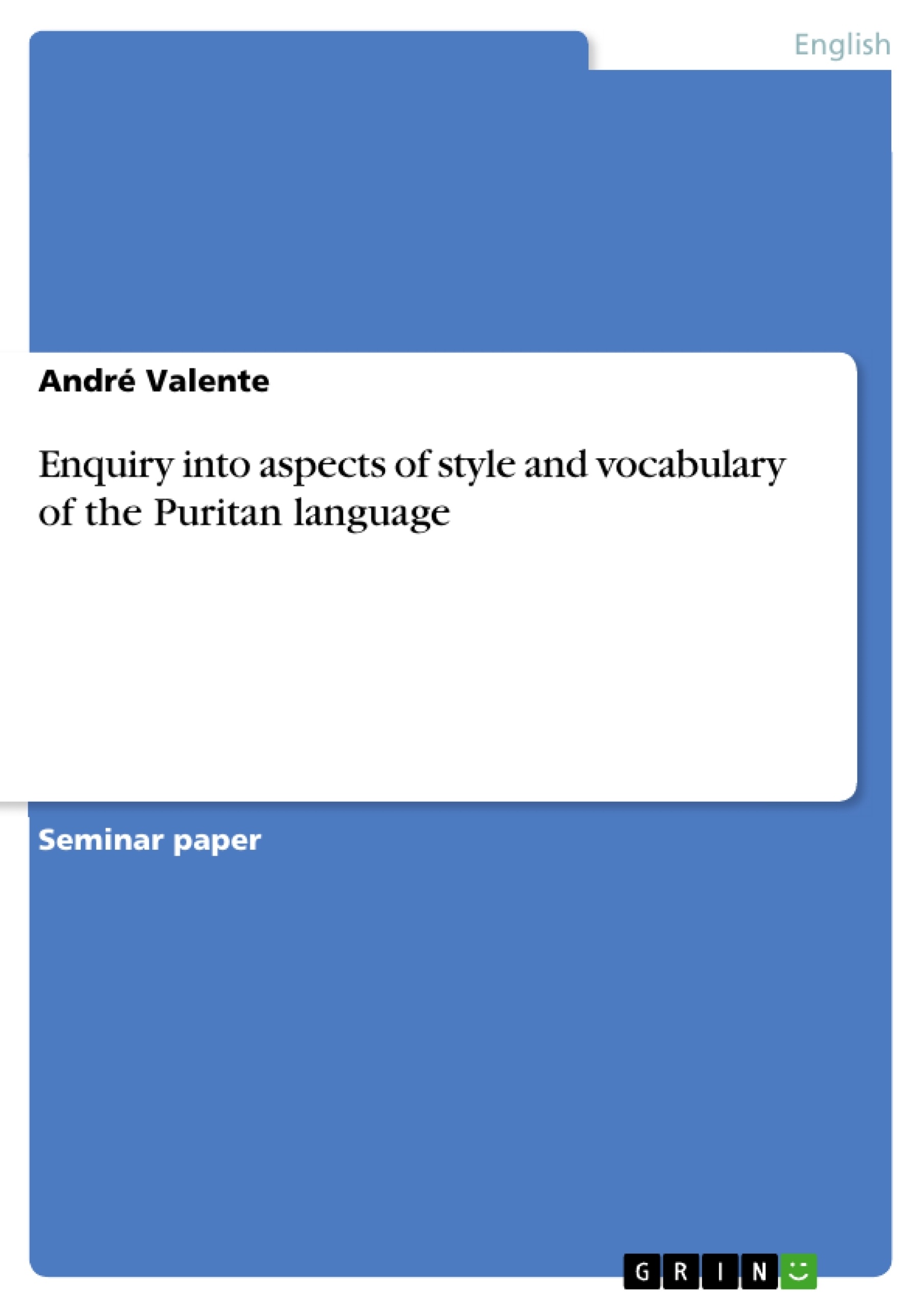During the Early Modern English period, the Puritans in England developed certain language usages of their own that were mainly on the lexical level. Their language showed variation especially in the vocabulary (Barber 1997: 23). In the standard work Early Modern English by Charles Barber, he claims that repetition is probably a feature of Puritan public speech and takes as a foundation a character from Ben Jonson’s play Bartholomew Fair (1997: 24). So the first aim of this paper is to prove or refute Barber’s assertion that Puritans used the stylistic device of repetition in public speaking. The second aim of this paper is to find out to what extent the Puritans used their vocabulary in different literary genres. There will also be a short explanation of the meaning of Puritan words that are found in the text. This aspect cannot be considered in full detail as it would go beyond the scope of this paper. Furthermore, the paper will comment on whether the depiction of Puritans in 16th and 17th century drama is realistic concerning the use of Puritan vocabulary and repetition of words and phrases.
Van Beek writes in An enquiry into puritan vocabulary, which served as a main source for this paper, that there had hardly been done any similar work on the Puritan vocabulary before his study (1969: 5). According to the online bibliography of the Modern Language Association (MLA), there have not been published any similar studies from 1969 till today. In fact, there are only some references to Puritan vocabulary in larger studies, e.g. in the latest books on Early Modern English by Manfred Görlach and Barber’s above mentioned work from 1997. However, they also do not look closely at some specific features of their vocabulary. The only detailed study on a particular aspect of the Puritan vocabulary is Die Self-Komposita der Puritanersprache by Karl Waentig dated 1932. One can say that there has not been done any quantitative research so far on the Puritan vocabulary in the Early Modern period. Concerning the other interest of this paper one can also say that there has not been done research on the repetition of words and phrases in Puritan public speech.
Table of Contents
- Introduction
- Puritans and their language
- What is Puritanism and when was it
- About the Puritan language
- Analysis of sources of Puritan language and discussion of the findings
- Analysis of the sermons
- Discussion of the Sermons
- Analysis of the letters
- Analysis of religious treatises and literary examples
- The religious treatises
- The literary examples
- Discussion of the findings on the Puritan vocabulary
- Analysis of the sermons
- Conclusion
- References
Objectives and Key Themes
This paper aims to investigate the language of the Puritans during the Early Modern English period, focusing on their vocabulary and the use of repetition in their public speaking. The study will examine whether Charles Barber's assertion that Puritans utilized the stylistic device of repetition in public speech holds true. Furthermore, it will explore the extent to which Puritans used their vocabulary across different literary genres.
- The use of repetition as a stylistic device in Puritan public speaking.
- The extent to which Puritan vocabulary differed from the standard language of the time.
- The use of Puritan vocabulary in different literary genres.
- The depiction of Puritan language in 16th and 17th century drama.
- The historical context and development of Puritanism.
Chapter Summaries
The introduction provides an overview of the study's objectives, focusing on the research gap concerning Puritan vocabulary and the lack of previous studies on repetition in Puritan public speech. It highlights the relevance of this study in contributing to the understanding of Early Modern English language and its variations.
Chapter 2 delves into the historical background of Puritanism, providing definitions and examining the term's evolution. It explores various interpretations of Puritanism and discusses the social class affiliations of Puritans.
Chapter 3 presents the analysis of various sources of Puritan language, including sermons, letters, religious treatises, and literary examples. This chapter examines the use of vocabulary and repetition in these texts, drawing upon Van Beek's work on Puritan vocabulary as a primary source. The analysis is designed to address the research questions outlined in the introduction.
Keywords
Puritan language, Early Modern English, vocabulary, repetition, sermons, letters, religious treatises, literary examples, Charles Barber, Van Beek, John Rainolds, Thomas Watson, Oliver Cromwell, Martin Marprelate, Thomas Cartwright, John Milton, John Bunyan.
- Quote paper
- André Valente (Author), 2008, Enquiry into aspects of style and vocabulary of the Puritan language, Munich, GRIN Verlag, https://www.grin.com/document/163189




